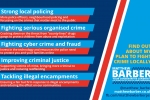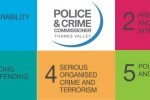Victims First, which supports victims of crime and abuse across Berkshire, Buckinghamshire and Oxfordshire, has launched a video today (5/11) to raise awareness of coercive control and emotional abuse in relationships.
Following on from Victims First’s ‘Know It Isn’t Love’ campaign launched in February this year, the video, Don’t Disappear’ highlights the red flags to look out for in a relationship which can be the warning signs of controlling behaviour and abuse.
Coercive control became a criminal offence in 2015 and involves an act or a pattern of acts of assault, threats, humiliation and intimidation or other abuse by a perpetrator that is used to harm, punish or frighten their victim.
Although many people associate domestic abuse with physical violence, coercive control recognises the damaging impact of other forms of abuse in relationships as well.
‘Don’t Disappear’ follows the story of Jamie and Emma, from the seemingly loving early stages of their relationship, to the development of abusive behaviour.
Although anyone can be a victim of coercive control, ‘Don’t Disappear’ is particularly aimed at younger people who may have less experience of relationships or people who are at the beginning of a relationship, to raise awareness of the red flags which at the time, may be missed or misinterpreted as acceptable behaviour.
The video covers a range of controlling behaviours exhibited from Jamie to Emma including:
- Jealousy and possessiveness including accusations of flirting and cheating
- Isolating her from her family and friends
- Controlling the use of her phone and social media
- Constantly checking on her whereabouts
- Sudden outbursts of anger and mood changes, and
- Love bombing - showering her with excessive affection and attention in order to retain control
Although in this example Emma is the victim, both men and women can be victims or perpetrators of coercive control which can take place in heterosexual and same sex relationships.
Other examples of coercive control include, depriving someone of basic needs, monitoring their time and activities, taking control over aspects of their everyday life such as where they can go or who they can see, humiliating, degrading or dehumanising someone, controlling their finances and making threats or intimidating behaviour.
Matthew Barber, Deputy Police and Crime Commissioner said “The impact of coercive and controlling relationships on victims can be damaging and long term; affecting their health, wellbeing and future relationships.
“Responses from our previous survey of victims in the Thames Valley showed that over half the abusive relationships began when the victim was under the age of 25. A primary aim of ‘Don’t Disappear’ therefore is to help young people, some of who may not have much relationship experience, identify and recognise abusive behaviours.
“Controlling, manipulative and bullying behaviours are not present in healthy relationships. These behaviours can escalate so it’s important that we continue to raise awareness of these red flags to help people recognise them and where necessary seek support.
“If anyone does feel that the behaviour they are facing in their relationship is abusive I would encourage them to contact Victims First on 0300 1234 148.”
Nazia Ahmed, Victims First Officer said “Since our ‘Know This Isn’t Love’ campaign, we’ve supported many people who have contacted us about abuse in their relationship. We’ve listened to their needs and provided emotional and practical support to help them to move forward with their lives.
“Coercive and controlling behaviours can develop gradually and because of this some people can find it difficult to recognise their relationship as abusive. If you’re not sure if what you’re experiencing is abuse, or if something just doesn’t feel right, you can contact us. We know it can be hard to describe what you have been experiencing but we will listen to you and we will work with you to get you some support.”
‘Don’t Disappear’ can be viewed on You Tube at https://youtu.be/d6rt8w5HBWw, the Victims First website www.victims-first.org.uk, or on the Victims First Facebook page @VictimsFirstTV
Quotes from victims of coercive control
Female victims of coercive control, aged 25 – 34 when relationship started. Victim experienced emotional abuse, control, (including financial control) intimidation and physical abuse.
“I feel like I was often made to feel bad about myself, guilty for having me time, seeing friends and family and not spending quality time together. I was made to feel bad about what I wore to work, he used to say why are you wearing that? I'd ask why not and he would say fine if that's the sort of attention you want. I felt like he completely took advantage of me and I was doing everything to keep him happy and not thinking about myself anymore. I felt trapped and isolated in the relationship.
“Listen to people around you and go with your gut feeling. I didn't recognise it was abuse for a while although I felt he was unfair I always gave the benefit of the doubt. I wasn't honest with my friends and family about everything he was doing and saying as I wanted them to like him in case he changed or things got better.
“The past year for me has been incredibly difficult and has caused me to have panic attacks along with the debts I now have to repay for several years. I never felt my case was that bad but the damage I feel it has caused is much more than I realised initially and I think it will take a long time to recover from.”
Female victim of coercive control aged under 16 at the start of the relationship
“He called me a s**g and told me I flirted with people if I spoke to them. He would stop me seeing friends and did not want me to socialise without him at all. He would verbally abuse me to have sex with him if I didn't want to. He hit me, spat at me and intimidated me. He stalked me when the relationship ended and threatened to kill himself if the relationship did not resume.
“I didn't feel abused at the time. I just thought he had some 'anger issues' and eventually I just did not have any love left for him.
“Abusive wouldn't have been the first word I used to describe our relationship for many years, as it was so many other things at the same time.
“I would say that just because they might not always be abusive or controlling. Just because they have some good qualities or some redeeming ways of being that it does not mean you aren't being abused or the relationship isn't abusive”.
Female victim of coercive control aged 25 – 34 when relationship started
“He made me feel guilty for speaking to male colleagues. Accused me of flirting if I wore a short skirt (just above the knee, in winter with thick tights) to work (where my legs would always be under a desk). He timed my journeys home from work and persistently questioned me on why it had taken so long to get home. He questioned me to try and catch me out if when I had gone out with friends - especially with male friends (who I had been friends with since childhood). He told me my friends/family were not worth my time and when we socialised, sat sullen, or in another room or make excuses not to go.
“I felt manipulated although at the time I did not recognise it as abuse. It was over 2 years later that I made the links. At the time I felt sad and as though the relationship was very hard work - but typically the control and negativity was interspersed with nice times, and doing nice things - in hindsight these times were when he had my undivided attention and we were away from areas where we were likely to see anyone who knew me or us. Retrospectively I feel as though I was manipulated, tricked, hoodwinked, played. I had to work hard to reconnect with my friends as I had alienated them.
“I was a young woman…. I absolutely did not recognise what was happening to me. I did not recognise I was being controlled.”



